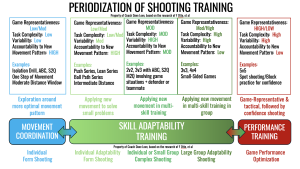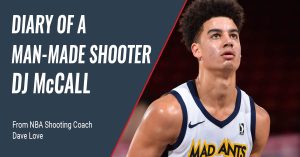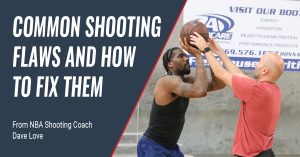With the NBA teams I’ve worked for, I’m usually assigned players. The team talks to the players about working with a shooting coach, the player signs off on the idea, then I come into the picture.
Over time, you get to know other players, but in most cases I don’t work with those players. I’m just building a relationship with them so they learn to trust me. Then, if needed, I can jump in and help someone.
One of the teams had a very good shooter. I loved the way he shot the ball. It was technically really good, and he got really good results. When I watched his workouts with other coaches, I wouldn’t every say anything other that “great shot”.
But like all players, this player eventually his a slump. Even in this situation, because he wasn’t one of my guys, I normally wouldn’t say anything to him other than some encouraging words. In this case, however, I saw a difference. I had seen his shot enough that I saw a difference between what he usually does, and what he was doing while he was in this slump.
So after practice one day I asked if I could spend 15 minutes with him. He agreed, but probably was thinking “oh great, the shooting coach thinks I can’t make shots anymore”.
I quickly reassured him that I loved his mechanics, and normally I would never say anything, but in this case I was pretty sure I knew why he was missing more than he normally does. Note the language I used. Still very positive. Never used the word slump. Implied that he would probably figure out himself, but that I could maybe support him.
I explained what I saw and why I thought it mattered. I gave him one drill from well inside his range to do. He shot a few shots and missed most. Then it clicked. His body quickly started to remember. The ball started going in, and when it did, we started to slowly speed up and move out. After 15 minutes he was shooting 3s and making them.
That game he shot the ball well. The habit appeared back to normal.
We never spoke about it again, and I never implied credit. Honestly, maybe he would have had that game even if I had said nothing at all.
But as a coach we need to remember to be very careful with players we don’t know well. I always go back to a lesson my mentor taught me. “You don’t have to say a lot. But when you say something, you’d better be right.”
I was confident I could help. I wasn’t changing him. I was getting him back to what he normally did. Because it worked, nothing was ever said again. Had it not worked, he would have gone back to the locker room and told guys I messed with his shot and screwed him up. You have to be very careful.



